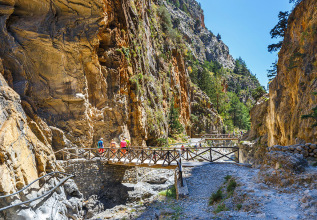6 MIN
VISIT GREECE
14th International Architecture Exhibition – La Biennale di Venezia

Greek Participation : Tourism Landscapes: Remaking Greece Venice, 07 June – 23 November 2014
Commissioner - Curator: Yannis Aesopos
Greece will participate for the 10th time in the International Architecture Exhibition - La Biennale di Venezia. The Greek participation in the 14th International Architecture Exhibition - La Biennale di Venezia, is directed and curated by the National Commissioner architect and professor Yannis Aesopos, under the title "Tourism Landscapes: Remaking Greece". It explores the role of tourism as a vehicle of modernization of Greece through the emergence of constructed tourism landscapes: hotels and resorts, organized beaches, archaeological sites and museums, public space designs and infrastructure facilities.
Moreover, it focuses on the concurrent (re)shaping of Greek national identity that is enhanced through the contact of the "other", the foreign, new and global element, which the activity of tourism presupposes.
1962 Megali Akti Beach, Vouliagmeni, Attica
P. Vassiliadis, E.Vourekas, P. Sakellarios Source: Κ. Megalokonomou
Greek history and the Greek landscape jointly made up the myth of contemporary Greece. Historical and cultural continuity through the unaltered landscape defined the identity of the modern Greek state. These same elements –history and landscape– provided the foundation for Greece's entry to a new sector of economic activity that intensified rapidly during the country's post-War modernization period: tourism, a global industry in which Greece was to play an important role at a global scale.
Tourism is by definition an extrovert activity that presupposes regular contact with the "other", being in touch with the new and adapting to it as well as a continuous (re)configuration of identity. In architectural terms, a constant remaking of the built landscape.
1962 Xenia Hotel, Spetses
Philippos Vokos
Source: Photographic Archives of Benaki Museum
In the decades of the 50s and 60s, landscapes that combined natural beauty with history were selected for the construction of seaside hotels and organized beaches that could provide the necessary infrastructure for the oncoming influx of tourists. This architecture, merging into a whole with its surrounding natural landscape, did not subordinate itself to the pre-existing formal givens of tradition, but, rather, adopted the modern architectural language, thus asserting an original absorption of modernity and the modern life-style.
In the decades that followed, the rapidly increasing numbers of tourists triggered a jump in scale. Large-scale hotel volumes, incorporating the formal principles of international style modernism, were implanted in sea-side landscapes presenting a clear separation between architecture and landscape. The development of the discourse of preservation of historical buildings and settlements and the arrival of post-modernity led to the imposition of morphological rules that limited design freedom and to the (iconographic) redefinition of the local and the traditional as "neo-traditional" or "neo-Greek", thus intensifying local identity.
Landscape
Photo: Panos Kokkinias
During the recent decade of opulence many elements of the international (minimalist) life-style and the wellness culture were incorporated in the design of the interior whose role became dominant, overshadowing that of the building's exterior.
Now, at the time of crisis, glamour seems to be fading out giving its place to a more "sober" or "primary" living often based on the search for sustainability and a limited environmental footprint. The constructed tourism landscapes –hotels, resorts, organized beaches, archaeological sites and museums, public spaces and infrastructures– constitute a constant negotiation between local and global, new and traditional, a recording of the dominant perception of our configured national identity at each given time within an ever homogenizing global culture. The exhibition examines and presents –through examples of both built and unrealized projects as well as through new designs developed for the exhibition by Greek and foreign architects– architectures of tourism as tools for the modernization of the country and the shaping of its identity.
Visit Tourism Landscapes: Remaking Greece
Exhibition Description : The exhibition "Tourism Landscapes: Remaking Greece" presented in the Greek pavilion consists of 2 parts: The Archival part presents the architectural production of tourism landscapes in Greece in the last 100 years. It is presented as a continuous surface of images placed on the surrounding walls of the Greek Pavilion’s interior. It is made of 3 sub-parts: photos of landscapes are placed on the lower part of the walls’ surfaces; they are topped with photos and drawings of tourism architecture and punctured by photos of ‘identity elements’ which introduce the anthropological dimension.
The New Projects part is placed in the center of the Pavilion and presents through models on identical stands of various heights that create an interior geometric 'island landscape' the proposals of 15 Greek and foreign architects for a tourism inhabitation in a Greek sea-side landscape.
These projects were produced specifically for the Biennale exhibition. The time frame is the end-of-crisis era that is characterized by limited resources, asks for the reassessment of priorities and the reestablishment of values, the reconsideration of human imposition on nature, and, through spiritual restructuring, the reappraisal of less. The coexistence of Greek and foreign architects refers to the interaction between local and foreign that tourism presupposes.
Commissioner - Curator: Yannis Aesopos
Yannis Aesopos is Professor of Architecture and Urban Design and former Chair, Department of Architecture, University of Patras, Greece.
He holds a Master in Architecture, Graduate School of Design, Harvard University and a Diploma of Architecture with Honors, National Technical University of Athens.
He is the Principal of Aesopos Architecture, Athens since 1997.
Visiting Professor, Master in Advanced Architectural Design, Graduate School of Architecture, Planning and Preservation, Columbia University, New York, 2014; Teaching Fellow, MArch in Urban Design, Bartlett School of Architecture, University College London, 2012-13, and Stanley J. Seeger Visiting Research Fellow, Princeton University, 2009.
Aesopos worked for Bernard Tschumi Architects, New York, 1992-95.
Since 2002 an Independent Expert for the European Union's Mies van der Rohe Prize for Architecture. He has published extensively in international architectural reviews.
He has co-edited Landscapes of Modernization: Greek Architecture 1960s and 1990s (Athens, 1999) and The Contemporary (Greek) City (Athens, 2001) and is completing Diffused Athens: Networks, Consumerism and Crisis on the urban and social transformations of Post-Olympic Athens.
The work of Aesopos Architecture was presented at the 13th Venice Biennale International Architectural Exhibition, 2012 and the 7th Venice Biennale International Architectural Exhibition, 2000.
Visit Yannis Aesopos Architecture
Press and Communication: Angeliki Evripioti | +30 6936069340 Anais Evripioti | +30 6936811303 press@tourismlandscapes.gr Parnithos 10, Filothei, Athens, Greece
Organisation: European Union, Greek Ministry of Environment, Energy and Climate Change, EPPERAA, NSRF, Greek Architects Association
Major Sponsors: Greek National Tourism Organization, Lamda Development
Supporters: Athens International Airport, Costa Navarino, Grace Hotels, Dolphin Capital Investors
Special Supporters: iGuzzini, L4A, Rigips, Photolab, WXYZ
Media Partners: Kathimerini, Architektones, Greek Architects, DOMES
Press Conference: Thursday 22.05.2014, 12:00p.m. Greek Ministry of Environment, Energy and Climate Change amphitheatre, 119 Mesogeion Avenue, 101 92, Athens, tel: +30 2106969450
General Information: Email: info@tourismlandscapes.gr
Venue: Greek Pavilion, Giardini Ca’ Giustinian, San Marco 1364/A, 30124 Venezia Hours of Operation: 09:00 – 18:00 Duration: 07 June – 23 November 2014


